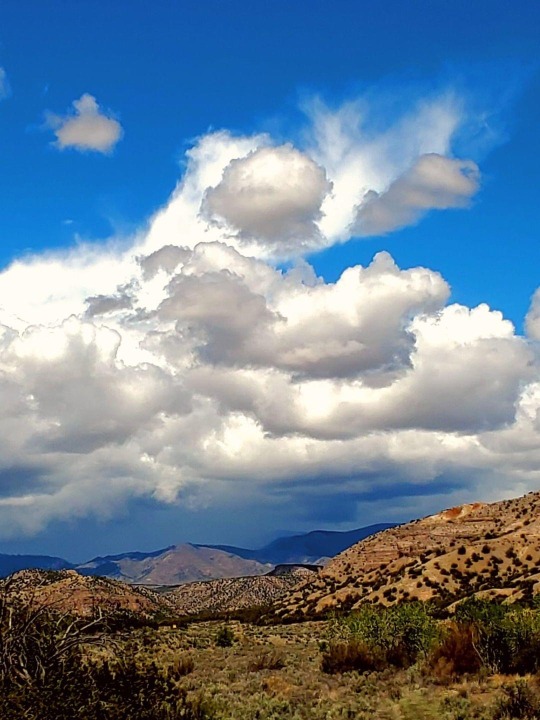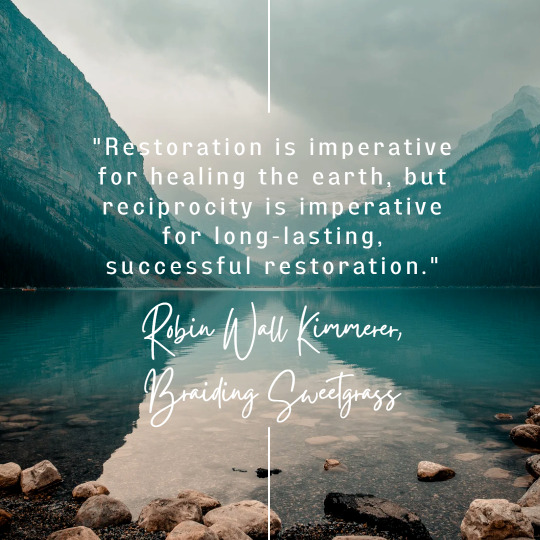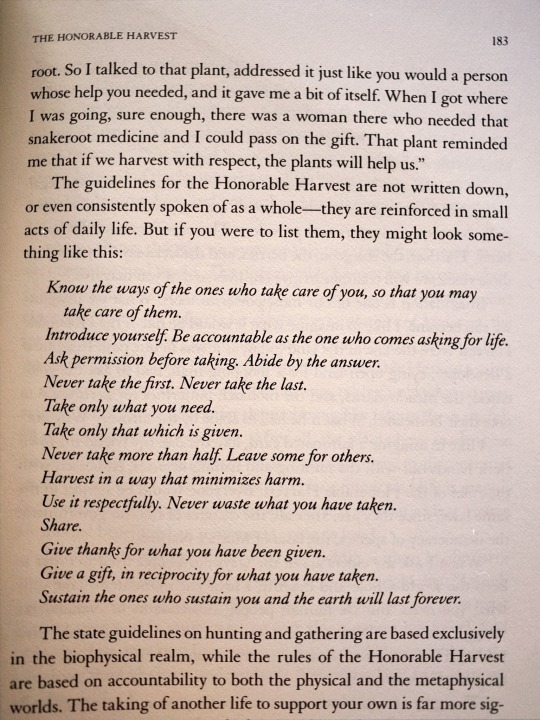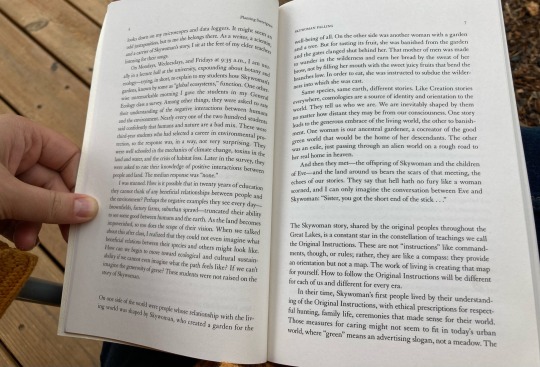#Braiding Sweetgrass: Indigenous Wisdom
Text

Braiding Sweetgrass: Indigenous Wisdom, Scientific Knowledge, and the Teachings of Plants, by Robin Wall Kimmerer
#Robin Wall Kimmerer#Braiding Sweetgrass: Indigenous Wisdom#Scientific Knowledge#and the Teachings of Plants#robin wall kimmerer braiding sweetgrass#braiding sweetgrass#braiding sweetgrass book#book#books#quote#quotes#indian#native american#indigenous quotes#indigenous#american indian#book quote#ecological#ecological restoration#restoration#nature#science#indigenous environmental network#environment#environmental#environmental quote#indigenous peoples#environmental science
6 notes
·
View notes
Text
I’m reading Robin Wall Kimmerer’s Braiding Sweetgrass at the moment and wow, I’ve cried every chapter so far. The way she nurtures her deep generational pain and turns it into love and wisdom is just awe-inspiring. A lesson we could all learn from
#braiding sweetgrass#hopepunk#solarpunk#environmentalism#social justice#cottagepunk#climate justice#bright future#community#optimism#robin wall kimmerer#indigenous wisdom#plant medicine#potawatomi#the honourable harvest#wiingaashk
138 notes
·
View notes
Text

Today we're seeing the most amazing combination of brilliant white and dark clouds. Other than in paintings by Tiepollo, I've never seen this before.
[Robert Scott Horton]
* * * *
“If gifts and responsibilities are one, then asking “What is our responsibility?” is the same as asking “What is our gift?”
― Robin Wall Kimmerer, Braiding Sweetgrass: Indigenous Wisdom, Scientific Knowledge and the Teachings of Plants
#clouds#New Mexico#Robert Scott Horton#quotes#Robin Wall Kimmerer#Braiding Sweetgrass: Indigenous Wisdom Scientific Knowledge and the Teaching of Plants
35 notes
·
View notes
Text
Quote of the Day - November 18, 2022
Quote of the Day – November 18, 2022

View On WordPress
#Books#Braiding Sweetgrass#Ecology#Environment#Indigenous People#Indigenous Quotes#Inspirational Quotes#Mysteries#Native American Heritage Month#Native Americans#Quote of the Day#Quotes#Quotes from Books#Restoration#Robin Wall Kimmerer#Wisdom
32 notes
·
View notes
Text
If you feel butthurt by the specific words people use for things, please remember all language is a construct we developed to contain our understanding of the world. It’s not the end all be all. Words can mean what you want them to mean. Other languages contain a multitude of meanings and inferences incomparable to what English can define. You’re fine. Chill.
#yes I’m reading Braiding Sweetgrass#yes I’m crying#yes I’m a little drunk#braiding sweetgrass#indigenous wisdom
5 notes
·
View notes
Text

Robin Wall Kimmerer, Braiding Sweetgrass
#honorable harvest#indigenous wisdom#robin wall kimmerer#braiding sweetgrass#nature#mother earth#farming#forest#hiking#sustainable living
2 notes
·
View notes
Text
Holy crap this book

Braiding sweetgrass by Robin Wall Kimmerer
5 notes
·
View notes
Text
Review of Robin Wall Kimmerer's "Braiding Sweetgrass"
Review of Robin Wall Kimmerer’s “Braiding Sweetgrass”
Robin Wall Kemmerer is uniquely qualified to pen this tome. Not only is she a member of the Potawatomi tribe, she also earned a PhD in botany. Her insights from both perspectives are priceless. These pages are filled with thoughts and insights entirely different from the white man’s view of life. Rather than being the superior being, Indigenous people see themselves as part of a greater…

View On WordPress
0 notes
Text
Herbalism book reccomendations 📚🌿
General herbalism:
The Herbal Medicine-Maker's Handbook by Green J. (2011)
20,000 Secrets of Tea: The Most Effective Ways to Benefit from Nature's Healing Herbs by Zak V. (1999)
The Modern Herbal Dispensatory: A Medicine-Making Guid by Easly T. (2016)
A-Z Guide to Drug-Herb-Vitamin Interactions by Gaby A.R.
American Herbal Products Association's Botanical Safety Handbook (2013)
Medical Herbalism: The Science and Practice of Herbal Medicine by Hoffman D. (2003)
Herbal Medicine for Beginners: Your Guide to Healing Common Ailments with 35 Medicinal Herbs by Swift K & Midura R (2018)
Today's Herbal Health: The Essential Reference Guide by Tenney L. (1983)
Today's Herbal Health for Women: The Modern Woman's Natural Health Guide by Tenney L (1996)
Today's Herbal Health for Children: A Comprehensive Guide to Understanding Nutrition and Herbal Medicine for Children by Tenney L. (1996)
For my black folks!!!
African Medicine: A Complete Guide to Yoruba Healing Science and African Herbal Remedies by Sawandi T.M. (2017)
Handbook of African Medicinal Plants by Iwu M.M. (1993)
Working The Roots: Over 400 Years of Traditional African American Healing by Lee M.E. (2017)
Hoodoo Medicine: Gullah Herbal Remedies by Mitchell F. (2011)
African American Slave Medicine: Herbal and non-Herbal Treatments by Covey H.C. (2008)
The Art & Practice of Spiritual Herbalism: Transform, Heal, and Remember with the Power of Plants and Ancestral Medicine by Rose K.M. (2022)
Indigenous authors & perspectives!!
Braiding Sweetgrass: Indigenous Wisdom, Scientific Knowledge and the Teachings of Plants by Kimmerer R.W. (2015)
Gathering moss by Kimmerer R.W. (2003)
The Plants Have So Much To Give All We Have To Do Is Ask by Siisip Geniusz M. (2005)
Our Knowledge Is Not Primitive: Decolonizing Botanical Anishinaabe Teachings by Djinn Geniusz W. (2009)
Ancient Pathways, Ancestral Knowledge: ethnobotany and ecological wisdom of indigenous peoples of northwestern North America by Turner N. (2014)
A Taste of Heritage: Crow Indian Recipes and Herbal Medicines by Hogan Snell A. (2006)
Medicines to Help Us by Belcourt C. (2007)
After the First Full Moon in April: A Sourcebook of Herbal Medicine from a California Indian Elder by Grant Peters J. (2010)
Latin american herbalism works!!
Earth Medicines: Ancestral Wisdom, Healing Recipes, and Wellness Rituals from a Curandera by Cocotzin Ruiz F. (2021)
Hierbas y plantas curativas by Chiti J.F. (2015)
Del cuerpo a las raíces by San Martín P.P., Cheuquelaf I. & Cerpa C. (2011)
Manual introductorio a la Ginecología Natural by San Martín P.P.
🌿This is what I have for now but I’ll update the post as I find and read new works, so keep coming if you wanna check for updates. Thank you for reading 🌿
#herbalism#herbal medicine#herbal health#green witch#green witchcraft#green magic#herbal magic#herbal witch#herbal witchcraft#plant medicine#plant magic#plant witch#folk healer#healing witch#healing magic#curanderismo#yerbera#curandera#rootwork#rootworker
2K notes
·
View notes
Text

GOOD BOOKS: Braiding Sweetgrass: Indigenous Wisdom, Scientific Knowledge, and the Teachings of Plants, by Robin Wall Kimmerer
#good reads#good book#good books#braiding sweetgrass#braiding sweetgrass book#robin wall kimmerer#braiding sweetgrass robin wall kimmerer#indigenous#indigenous people#plants#plant#book#books#reading#read#reader#science#scientific#scientific knowledge#idigenous wisdom#wisdom#plant knowledge#teach#teaching#teacher
0 notes
Text
As a botanist, Robin Wall Kimmerer has been trained to ask questions of nature with the tools of science. As a member of the Citizen Potawatomi Nation, she embraces the notion that plants and animals are our oldest teachers. In Braiding Sweetgrass, Kimmerer brings these lenses of knowledge together to show that the awakening of a wider ecological consciousness requires the acknowledgment and celebration of our reciprocal relationship with the rest of the living world. For only when we can hear the languages of other beings are we capable of understanding the generosity of the earth, and learning to give our own gifts in return.

125 notes
·
View notes
Text

In northern New Mexico/southern Colorado, the monsoon season which normally commences in July instead started at the end of May... with the result that a normally fairly arid region has been turned very green. The gorge of the Río Grande del Norte between Taos and the Colorado-New Mexico border. Photo: Elijah Rael (June 5, 2023)
[Robert Scott Horton]
* * * *
“One thing I’ve learned in the woods is that there is no such thing as random. Everything is steeped in meaning, colored by relationships, one thing with another.”
― Robin Wall Kimmerer, Braiding Sweetgrass: Indigenous Wisdom, Scientific Knowledge and the Teachings of Plants
#Northern New Mexico#Rio Grande del Norte#Elijah Rael#Robert Scott Horton#Robin Wall Kimmerer#Braiding Sweetgrass: Indigenous Wisdom Scientific Knowledge and the Teachings of Plants
27 notes
·
View notes
Text
Developing Local Cultus: A Companion Library
In preparation for the revamping of my Local Cultus series over on wordpress, I have begun to gather this small reference library for anyone who may be interested. Containing mostly works which inspired me to set out on the path of developing a localized religious practice, as well as some of my research materials. For those interested in the series, and the topic which it covers, I absolutely recommend giving these titles a flip through.
The first of this series, an introduction and mapping out of what is to come, will be up on the Barn Cultus website by the end of July.
Braiding Sweetgrass by Robin Wall Kimmerer
Indispensable knowledge of ecological relationships as written by an indigenous woman and professor of environmental biology.
The Green Mysteries by Daniel Schulke
An encyclopedia of the spiritual, magical, and folkloric qualities of plants. Written by the Magister of the Sabbatic tradition.
The Golden Bough by James George Frazer
Frazer tracks the role of religion and magic up until the modern day, introducing along the way some of the key ideas behind my style of cultus developing (such as re-enchantment). This book is always on my reference shelf, close at hand, and while the anthropology is at times laughably outdated, it is a beautiful read with some interesting groundwork.
Viridarium Umbris by Daniel Schulke
I'd be remiss to not include this in my list. Another Schulke work and a comprehensive grimoire of verdant magics. I personally view this book as overhyped, though a should-read, perhaps not a must.
Demons & Spirits of the Land: Ancestral Lore and Practices
A foundational text of folkloric land spirits and the operations used by Pre-Modern Europe to interact with them.
Roman Cult Images: The Lives and Worship of Idols from the Iron Age to Late Antiquity
In my own eyes, the finding of localized images. Images references the faces, attributes, and fauna of the region in which each divinity of the cultus is depicted. The crafting of cult images, in the forms of eikons and idols, is another aspect of this.
Idolatry Restor'd by Daniel Schulke
Schulke speaks to the ensouled fetish, which connects greatly to the idea of the Living Statue and the cultic image. More of a sorcerous read, but worth it nontheless.
We Are In The Middle of Forever: Indigenous Voices of Turtle Island on the Changing Earth
I hold the strong conviction that those of us in America who find our bloodlines here through the powers of colonialism absolutely must be listening to indigenous wisdom- full stop. Publications like this one are a huge boon to the mending of the rift between the descendants of colonialism and the land which they inhabit. I think this becomes doubly important to those practices land-based religions.
The Sacred and the Profane by Mircea Eliade
I come with the bias of studying the anthropology of religion full time. This book has in many ways aided in bridging the gap between my academic studies and the building of my theologies, and is a profound read by an author with a storied collection of publications within the field.
Mystai: Dancing out the Mysteries of Dionysus
An interesting look into the mystery cult of Dionysus during late antiquity. Mystery cults often operated regionally and with localized aspects to their mysteries.
Eleusinian Mysteries and Rites by Dudley Wright
All literature on the Eleusinian mysteries is a boon- this is my recommendation. Following the ritual life of the local agriculture cult which has gone down in history as one of the largest surviving cults into the Christianization of Greece.
Walking the Worlds: Building Regional Cultus
Less of an academic read than the others on this list, but one I found equally as inspiring. The articles speak to diaspora and tensions of modern polytheism, and I think without some kind of academic pre-knowledge of these topics the articles themselves would fall a little flat, but a worthy read for the genuine pursuant.
Mystery Cults in the Greek and Roman World by the MET
Kongo in Haiti: A New Approach to Religious Syncretism
by Luc de Heusch
This article explores religious syncretism through the lens of Vodou, an African traditional religion known for its syncretic relationship with Christianity here in the US and Haiti. De Heusch explores a little bit of the roots in West Africa, and how the religion operates in both syncretic and nonsyncretic ways across the African diaspora.
Why Cecropian Minerva?: Hellenic Syncretism as System
by Luther H. Martin
This article explores syncretism in a western context, from the other side of the isle. This is not syncretism brought on by oppression and colonialism, instead highlighting syncretism theologically proposed by the oppressors, a favorite of the Romans. Martin explores the theology of this, the politics of this, and offers interesting analysis of the historical evidence.
Epithets in the Orphic Hymns by W. K. C. Guthrie
There's powers in names. You know it, I know it, Guthrie certainly knows it. Behind that power is meaning. While Guthrie does not particularly touch on regionalized epithets, I still find this to a be a great read to get one thinking about cult specific poetic titles.
100 notes
·
View notes
Photo

“The trees act not as individuals, but somehow as a collective. Exactly how they do this, we don’t yet know. But what we see is the power of unity. What happens to one happens to us all. We can starve together or feast together.”
― Robin Wall Kimmerer, Braiding Sweetgrass: Indigenous Wisdom, Scientific Knowledge and the Teachings of Plants
106 notes
·
View notes
Text
What would it be like, I wondered, to live with that heightened sensitivity to the lives given for ours?
What would it be like, I wondered, to live with that heightened sensitivity to the lives given for ours? To consider the tree in the Kleenex, the algae in the toothpaste, the oaks in the floor, the grapes in the wine; to follow back the thread of life in everything and pay it respect? Once you start, it’s hard to stop, and you begin to feel yourself awash in gifts.
— Robin Wall Kimmerer, Braiding Sweetgrass: Indigenous Wisdom, Scientific Knowledge and The Teachings of Plants (Milkweed Editions, September 16, 2013)
182 notes
·
View notes
Text
Revering Nature
Throughout my search for science-based pagan books to help me on this path of mine, Braiding Sweetgrass by Robin Wall Kimmerer kept popping up--so I finally read it.
I would recommend it to most people, especially those who feel a special connection to the natural world but don't exactly know why. I can see this book offending a lot of people on the right side of the political spectrum, but if you fall into that category I'm betting you found this blog in an accidental or ironic sense anyway.
Ultimately this book is all about reverence for the natural world and the importance of maintaining a spirit of respect, reciprocity and responsibility for the gifts given to us by nature. It makes a strong case for maintaining balance, which is a) weaved throughout pagan religions, b) arguably foundational to them all, and thus c) deeply relevant to my studies. Kimmerer also explains the importance of ritual and ceremony to human beings, regardless of our beliefs (or lack thereof.)
Bits of wisdom I marked down from this important book (just in case this isn't clear, everything inside quotation marks is taken directly from the book) separated by theme:
I. Exploitation of Natural Resources
Kimmerer disapproves of the belief that the natural world is human property to be produced and sold: "The commodification of the natural world is just a popular story told by humans. Strawberries belong to themselves."
II. Indigenous Wisdom & Animism
Thirty percent of English words are verbs, but in many indigenous American tribes this proportion is as much as seventy percent (as with the Potawatomi tribe). The language does not divide between masculine and feminine, but rather between animate and non-animate. We can learn from Potawatomi and other indigenous "ways of knowing" because even their very language acts as "a mirror for seeing the animacy of the world," and honors the universe as "a communion of subjects."
III. The Power of Balance
The author stresses the need to maintain balance with nature and life in general: "Balance is not a passive resting place--it takes work, balancing the giving and taking, the raking out and the putting in." Kimmerer suggests that we should temper our desires with self-discipline, which "builds resistance against the insidious germ of taking too much."
IV. Capitalism and the Death of Contentment
Kimmerer comments on consumer society's tendency to see contentment as a "radicalist proposition" and capitalism's dependence on the creation of unmet desires. This reminded me of The Door to Witchcraft by Tonya Brown, when she writes that we should try our best to have an abundance mentality rather than one of scarcity. We should take from nature only what we need, and give back whenever we can.
V. Importance of Ritual and Ceremony
Kimmerer beautifully explains humans' innate need for ritual and ceremony: "Ceremony focuses attention so that attention becomes intention. . .ceremonies transcend the boundaries of the individual and resonate beyond the human realm. These acts of reverence are powerfully pragmatic." This is deeply reminiscent of my post last year on the psychological benefits of ritual ceremony. This affirmed my belief of why these behaviors are ubiquitous despite all varying forms of thought and belief.
VII. Pessimism in the Environmentalist Community
Regarding the fatalist attitude that has crept into many environmentalist conversations: "Environmentalism becomes synonymous with dire predictions and powerless feelings. Despair is paralysis. It robs us of agency. It blinds us to our own power and the power of the earth."
#nature worship#pagan#Pagan#Neopaganism#Neo-paganism#atheopaganism#atheopagan#naturalistic paganism#atheist witch#secular witchcraft#sass witchcraft#magick#witchcraft#witch#witches#wicca#paganism#bookblr#women writers#writers of tumblr#litblr#spilled ink#spilled words#new age spirituality
78 notes
·
View notes